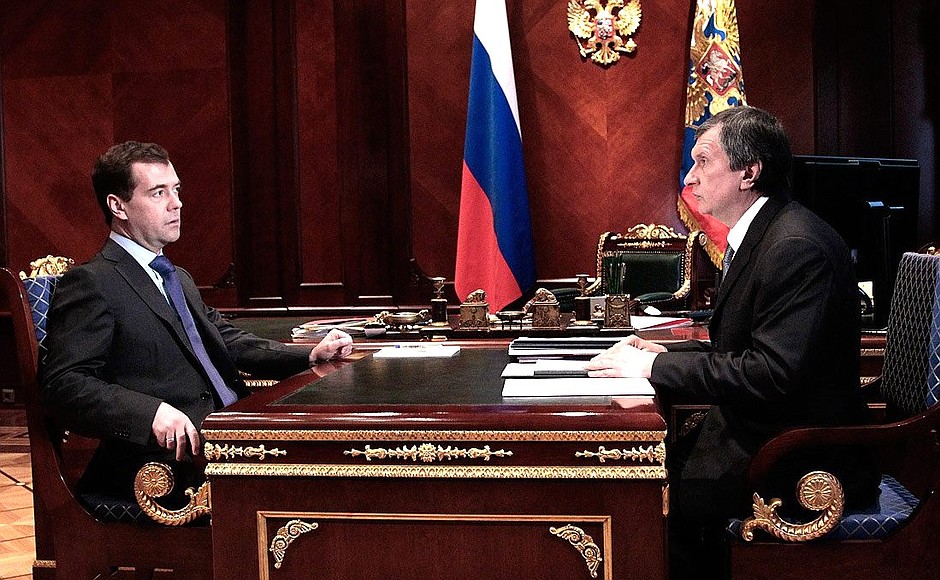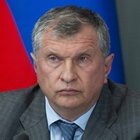
* * *
President of Russia Dmitry Medvedev: Mr Sechin, let’s begin with the subject discussed during my visit to Khakassia; preparation of the law on ensuring energy security and the safety and security of our energy facilities. Please tell me what has been done so far, whether the final draft is ready, and what objectives it sets.
While on this subject, I spoke with Japanese Prime Minister Naoto Kan today. They have suffered a great misfortune of course, a huge national disaster. Our task now is to help our neighbours, and I have already given this instruction to our Cabinet. I know that you have already met to discuss various matters, including energy supplies in order to help restore the energy balance that was disrupted by the earthquake and the tsunami that followed. We have agreed that our ministries will stay in contact and take all the necessary decisions.
At the same time of course, we need to keep watch on the state of other sites too. We are close neighbours after all, and in this respect our task is simply to monitor the general situation, including, of course, the situation with Japan’s nuclear power plants. As the Emergency Situations Ministry and Rosatom have reported, they do have problems in Japan with these power plants right now, but things are under control overall. I heard the same thing today from the Japanese Prime Minister. Whatever the case, these are complex energy facilities and we will of course need to continue working together with our Japanese colleagues to monitor the situation.
Deputy Prime Minister Igor Sechin: Mr President, I will begin with this last issue, if you permit.
“I always supported all-round development of our economic ties with Japan. Japan is not just our neighbour but also a big market, and there is a lot of potential for cooperation. In this situation our duty is to provide moral support of course, but we also need to keep the future in mind too.”
Acting on your instruction, the Cabinet met on Saturday to discuss our proposals for how to help our partners in the Far East, in Japan specifically, in the aftermath of the earthquake and tsunami. Of course, we need to make a thorough analysis of these events ourselves and draw our own conclusions too. The IAEA will also investigate what has happened. One of the things that exacerbated the situation it seems was that the nuclear power station in question was built in a seismically active area, and near the coast, what’s more. This meant that first the tremors and then the tsunami increased the situation’s seriousness.
We are drafting proposals for aid for our partners. I sent a letter today to Japanese Economy, Trade and Industry Minister Banri Kaeida with proposals to hold talks on organised provision of assistance, including energy supplies. They have already made requests concerning gas supplies, and Gazprom is working right now on organising two gas carriers to ship 100,000 tons of liquefied natural gas in April and again in May, and I think this all going to be possible.
We are studying the possibilities for increasing LNG supplies. There are some problems in that contracts have already been signed for most of the available supplies, but we will of course make sure that any supplies still available will go above all to Japan. In this respect we will have to hold additional talks with the participants in the Sakhlin-2 consortium.
Dmitry Medvedev: I think the situation today is such that even though contracts have already been signed for LNG supplies, our partners should also be willing to make some concessions. Japan, one of our neighbours, and a big country, has been hit by a huge disaster after all, and in this situation it could be possible to make some changes to the current contracts. I think this is something that could be discussed.
Igor Sechin: Yes, our position is that we need to help Japan, of course.
Furthermore, nuclear energy accounts for 30 percent of Japan’s energy supplies, and this balance will change now that our Japanese partners are being forced to shut down reactors. Eleven units have already been shut down of the total 54 reactors they have in operation. Gas accounts for 17 percent of their energy, and coal for 22 percent. We are ready to increase coal supplies. A delegation from SUEK will visit Japan this week, and Mechel is also ready to send a delegation. This will also be a subject for discussion with our colleagues.
As you know, our Far East region also has reserve hydropower capacity. In the long term, we could redirect around 6,000 megawatts in electricity supplies to Japan. This would require some organisational work first, though. There is a project to build an undersea cable, and some preliminary work has already been done. The idea is to lay the cable from Sakhalin to Japan, and we would also need to lay cable to Sakhalin itself – a total of 32 km of cable. This project could be ready quite quickly. Of course, the work itself would take a couple of years, but it would provide a long-term solution. We are ready to work on this together with our Japanese colleagues and their companies, and we could have the proposals ready and send them to our colleagues very soon.
Dmitry Medvedev: I always supported all-round development of our economic ties with Japan because this country is not just our neighbour but also a big market, and there is a lot of potential for cooperation. In this situation our duty is to provide moral support of course, but we also need to keep the future in mind too, so work on this. We have agreed to keep in touch on this issue, and if our Japanese colleagues come to any decisions on these matters they will keep us informed.
Igor Sechin: Yes, Mr President. We have already begun this work.
Dmitry Medvedev: Good.
Igor Sechin: Regarding the meeting you held in Khakassia, you gave the instruction to report today on the work to get the draft law on anti-terrorism protection of energy sector facilities ready for submission. You gave the instruction to draft this law following the terrorist attack on the Baksan Hydroelectric Power Station. This document was the object of very thorough work over a 6-month period. We submitted it to the Presidential Executive Office and received comments. We have now worked through all of these points together with the Executive Office, and today, if you agree, we will send the draft law to the Executive Office for the final approval procedures.
“Preparation of the law on ensuring energy security and the safety and security of our energy facilities. Work needs to be more rapid on laws of this kind, especially when they concern prevention of illegal activity and terrorist attacks.”
What are its objectives? For a start, we did not have a law of this kind on our books, and it is absolutely essential of course in that it will help to improve anti-terrorist protection and set an overall new approach to getting more systematic information on the situation at our various energy facilities.
It introduces a system that categorises energy sector facilities and sets out the protection and security demands for each category of sites. This system takes into account the degree of threat, the estimated degree of potential danger, and the seriousness of possible consequences. Sites are also categorised according to their current degree of protection. We are not talking about creating a whole system from scratch in other words, but are making maximum use of what has already been done, and integrating it into the new proposals. We will introduce security passports for energy sector facilities, containing the technical description of protection measures, measures needed to improve and standardise them, and regulations prohibiting energy sector buildings, facilities and sites from being rented out or used for purposes not related to their production activity. If you recall, one of the problems we had was with a dam in the Moscow Region, when the dam was used for various entertainment events, cafes and restaurants, and this dramatically reduced the possibilities for ensuring adequate protection.
The draft law contains provisions introducing compulsory insurance of liability for damage caused as a result of a terrorist attack. The minimum insurance payment has been set at 2 million rubles. We also propose introducing specific requirements to personnel, including as regards their physical fitness, and also requirement to ensuring the security of energy sector facilities’ information systems, and making company directors personally responsible for organising and ensuring security and protection at energy sector sites.
All of the draft law’s provisions have been discussed and coordinated with the different ministries, including the Justice Ministry. With your approval, we will send the draft law to the Executive Office today.
Dmitry Medvedev: I agree of course. I want you and the Executive Office to keep in mind that work needs to be more rapid on laws of this kind, especially when they concern prevention of illegal activity and terrorist attacks.
The document was already ready some time ago after all.
Igor Sechin: Yes, the document was ready some time ago, you are right, Mr President, and it is absolutely essential.
Dmitry Medvedev: So work faster, because the faster we approve it, the better the chance that our power stations will be properly prepared against any possible terrorist attacks and other kinds of crimes and illegal activity.
So, we are agreed then, and you can submit the draft law.
<…>
